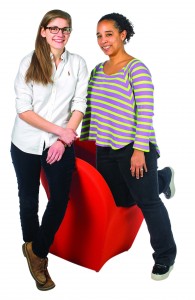Republished from Human Ecology Magazine, Spring 2016
Annie Erickson & Eve De Rosa

What does your lab study?
Annie Erickson ’16: Our lab is interested in studying the neural basis of cognitive processes such as attention, learning, and memory. To investigate these complex neural mechanisms, we use a cross-species approach studying both human and animals. We are interested in the neurochemicals that modulate cognition— specifically, a neurotransmitter called acetylcholine. My project focuses on the effect of acute and chronic caffeine intake on cognition in rats, testing whether caffeine can rescue cognitive deficits that have been induced by blocking acetylcholine.
Why study caffeine?
Eve De Rosa, Associate Professor of Human Development and Rebecca Q. and James C. Morgan Sesquicentennial Fellow: We all drink coffee, but we don’t always give deep thought to how it affects attention, learning, and memory. That’s why I love the real-world importance of Annie’s honors thesis question. She’s finding cognitive tasks that both rats and humans can perform so that we can translate the basic science experiments in the lab to our understanding of human cognition.
What do you like about this work?
Erickson: After following this project from conception to experimental setup to final execution, it’ll be incredibly exciting to see the results. It’s been inspiring to work with Eve, and to see the way she’s able to balance research, teaching, and family. She’s so enthusiastic and positive, and I really enjoy discussing my ideas with her, because she’s always so encouraging.
De Rosa: I love mentoring students like Annie! After participating in the lab as an undergrad research assistant, she approached me with this wonderful question about looking at caffeine’s ability to boost cognition, and whether it was caffeine’s interaction with acetylcholine that underlies this ability.
The fact that caffeine is a cognitive enhancer is something I was already aware of, but not that it might be important in slowing the decline of pathological cognitive aging, like in Alzheimer’s disease. When Annie brought that idea to me, I could see why it might be worth taking a chance to pursue the question.
What’s the risk?
De Rosa: Rat neuroscience is expensive, and it’s not my primary research focus. I’m very interested in acetylcholine, which declines during normal aging, and in using functional Magnetic Resonance Imaging to assess brain activity. But Annie’s research is something I would never have pursued on my own. And now I’m having so much fun reading the literature, thinking about how it relates to my larger research vision.
Erickson: Through the process of developing my independent project, Eve has provided crucial advice while also being incredibly flexible in letting me explore different ideas. She’s shown how important collaboration is for successful research and I’ve learned so much about thinking and writing scientifically—skills that are fundamental to a future in research.
In 2015, Annie Erickson received the Human Ecology Undergraduate Summer Research Stipend, and is currently working toward an honors thesis funded by the Human Ecology Alumni Association.

